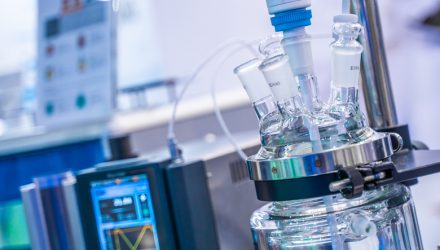Biotechnology stocks and sector-related ETFs are finally beginning to shine, and their current momentum could be maintained into the new year.
The iShares Nasdaq Biotechnology ETF (NasdaqGS: IBB), the largest biotech-related ETF, increased 15.8% over the past three months and rose 26.8% year-to-date. The underlying Nasdaq Biotechnology Index has advanced 22% so far this quarter, compared to the S&P 500’s 8.2% gain.
Bolstering the biotech segment, a number of factors like new innovation, a spate of deals and easing worries about political risks helped strengthen this healthcare sub-sector’s outlook, the Wall Street Journal reports.
Biotech stocks tend to provide the potential for outsize gains in response to research breakthroughs, but they are also vulnerable to steep losses since companies often have no income-generating products and developing treatments have no guarantee of receiving government approval.
“Biotech is a volatile sector, so it is prone to swings in market psychology in a risk-off environment,” Andy Acker, who manages the Janus Henderson Global Life Sciences Fund, told the WSJ.
Investors have also attributed the recovery in the sector to a number of mergers and acquisitions that helped bolster the outlook for biotech names.
“It shows that the big pharmaceutical companies really want and need this innovation,” Acker added. “That just generates more excitement for the sector.”
Fears of political risk are also waning. Investors are closely watching government efforts from both parties to lower drug prices.
Looking ahead, investors are growing more optimistic about the sector as economic data helped ease fears of a slowdown.
“If we are feeling like the economy is on surer ground, these companies will have much easier access to capital to keep funding their research,” Diane Jaffee, senior portfolio manager at TCW, told the WSJ.
Morgan Stanley’s David Risinger recently upgraded his view on the industry to “Attractive” from “In-Line”, Barron’s reported.
“We expect novel disease treatments, combined with limited patent expiration exposure, to yield healthy growth in the coming years,” Risinger said in a note, adding that pricing in the U.S. would be “healthy” in 2020.
“We anticipate high rates of drug approvals in coming years because new drug applications have stepped up by over 60% over the past few years,” he said.
For more information on the healthcare segment, visit our healthcare category.








